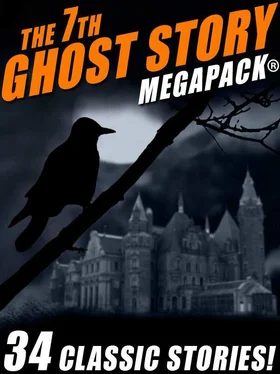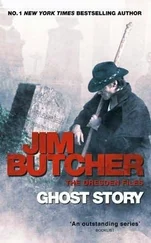He laughed when I said that—a low, chuckling, rather sly laugh. “No,” he said, “I dessay not, officer. I’m a very quiet sort of person. You might say, in fact, noiseless. Just so.”
I looked at him narrowly, feeling considerably surprised and astonished at his presence. He was a thickly built man, with a square face and heavy chin. His nose was small, but aggressive; his eyes were little and overshadowed by heavy eyebrows; I could see them twinkle when he spoke. As for his dress, it was in keeping with his face.
He wore a rough suit of woolen or frieze; a thick, gayly colored Belcher neckerchief encircled his bull-like throat, and in his big hands he continually twirled and twisted a fur cap, made apparently out of the skin of some favorite dog. As he sat there smiling at me and saying nothing, it made me feel uncomfortable.
“What do you want with me?” I asked.
“Just a little matter o’ business,” he answered.
“You should have gone to the office,” I said. “We’re not supposed to do business at home.”
“Right you are, guv’nor,” he replied; “but I wanted to see you. It’s you that’s got to do my job. If I’d ha’ seen the superintendent he might ha’ put somebody else on to it. That wouldn’t ha’ suited me. You see, officer, you’re young, and nat’rally eager-like for promotion. Eh?”
“What is it you want?” I inquired again.
“Ain’t you eager to be promoted?” he reiterated. “Ain’t you now, officer?”
I saw no reason why I should conceal the fact, even from this strange visitor. I admitted that I was eager for promotion.
“Ah!” he said, with a satisfied smile; “I’m glad o’ that. It’ll make you all the keener. Now, officer, you listen to me. I’m a-goin’ to put you on to a nice little job. Ah! I dessay you’ll be a sergeant before long, you will. You’ll be complimented and praised for your clever conduck in this ’ere affair. Mark my words if you ain’t.”
“Out with it,” I said, fancying I saw through the man’s meaning. “You’re going to split on some of your pals, I suppose, and you’ll want a reward.”
He shook his head. “A reward,” he said, “wouldn’t be no use to me at all—no, not if it was a thousand pounds. No, it ain’t nothing to do with reward. But now, officer, did you ever hear of Light Toed Jim?”
Light Toed Jim! I should have been a poor detective if I had not. Why, the man known under that sobriquet was one of the cleverest burglars and thieves in England, and had enjoyed such a famous career that his name was a household word. At that moment there was an additional interest attached to him. He had been convicted of burglary at the Northminster assizes in 1871, and sentenced to ten years’ penal servitude. After serving nearly two years of his time he had escaped from Portland, getting away in such clever fashion that he had never been heard of since. Where he was no one could say; but lately there had been a strong suspicion among the police that Light Toed Jim was at his old tricks again.
“Light Toed Jim!” I repeated. “I should think so. Why, what do you know about him?”
He smiled and nodded his head. “Light Toed Jim,” said he, “is in Westford at this ’ere hidentical moment. Listen to me, officer. Light Toed Jim is a-goin’ to crack a crib tonight. Said crib is the mansion of Miss Singleton, that ’ere rich old lady as lives out on the Mapleton Road. You know her—awfully rich, with naught but women servants and animals about the place. There’s some very valyable plate there. That’s what Light Toed Jim’s after. He’ll get in through the scullery window about one a.m., then he’ll pass through the back and front kitchens and into the butler’s pantry—only it’s a butleress, ’cos there ain’t no men at all—and there he’ll set to work on the safe. Some of his late pals in Portland give him the tip about this ’ere job.”
“How did you come to hear of it?” I asked.
“Never mind, guv’nor. You wouldn’t understand. Now, I wants you to be up there tonight and to nab Light Toed Jim red-handed, so to speak. It’ll mean promotion for you, and it’ll suit me down to the ground. You wants to be about and to watch him enter. Then follow him and dog him. And be armed, officer, for Jim’ll fight like a tiger if you don’t draw his teeth first.”
“Now, look here, my man,” said I, “this is all very well, but it’s all irregular. You must just tell me who you are and how you come to be in Light Toed Jim’s secrets, and I’ll put it down in black and white.”
I turned away from him to get my writing materials. I was not half a minute with my back to him, but when I turned round he was gone. The door was shut, but I had heard no sound from it either opening or shutting. Quick as thought I darted to it, tore it wide open, and looked down the narrow staircase. There was no one there. I ran hastily downstairs into the passage, and found my landlady, Mrs. Marriner, standing at the open door with a female friend. “Mrs. Marriner,” I said, breaking in upon their conversation, “which way did that man go who came downstairs just now?”
Mrs. Marriner looked at me strangely. “There ain’t been no man come downstairs, Mr. Parker,” said she; “leastways, not this good three-quarters of an hour, which me and Missis Higgins ’ere, as ’ave come out to take an airing, her having been ironin’ all this blessed day, has been standin’ ’ere all the time and ain’t never seen a soul.”
“Nonsense,” I said. “A man came down from my room just now—the man you sent up twenty minutes since.”
Mrs. Marriner looked at me with an expression betokening the most profound astonishment. Mrs. Higgins sighed deeply.
“Mr. Parker,” said Mrs. Marriner, “sorry am I to say it, sir, but you’re either intoxicated or else you’re a-sickening for brain fever, sir. There ain’t no person entered this door, in or out, for nigh onto an hour, as me and Missis Higgins ’ere will take our Bible oaths on.”
I went upstairs and looked in the rooms on either side of mine. The man was not there. I looked under my bed, and of course he was not there. He must have gone downstairs. But then the women must have seen him. There was only one door to the house. I gave it up in despair and began to smoke my pipe. By the time I had drawn the last whiff I decided that if anyone was “intoxicated,” it was probably Mrs. Marriner and Mrs. Higgins, and that my strange visitor had departed by the door. I was not going to believe that he had anything supernatural about him.
I had no duty that night, and as the hours wore on I found myself stern in my resolve to go up to Miss Singleton’s house and see what I could make out of my informant’s story. It was my opinion that my late visitor was a whilom “pal” of Light Toed Jim, and that having become aware of the latter’s plot, he had, for some reason of his own, decided to split on his old chum. Thieves’ disagreement is an honest man’s opportunity, and I determined to solve the truth of the story told me. Lest it should come to nothing, I decided not to report the matter to my chief. If I could really capture Light Toed Jim, my success would be all the more brilliant by being suddenly sprung upon the authorities.
I made my plan of action rapidly. I took a revolver with me and went up to Miss Singleton’s house. Fortunately, I knew the housekeeper there—a middle-aged, strong-minded woman, not easily frightened, which was a good thing. To her I communicated such information as I considered necessary. She consented to conceal me in the room where the safe stood. There was a cupboard close by the safe from which I could command a full view of the burglar’s operations and pounce upon him at the right moment. If only my information was to be relied upon, there was every chance of my capturing the famous burglar.
Читать дальше












